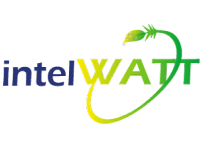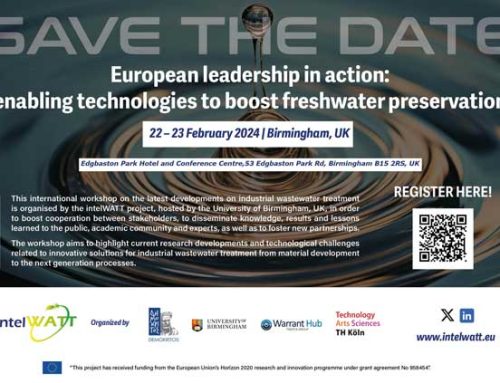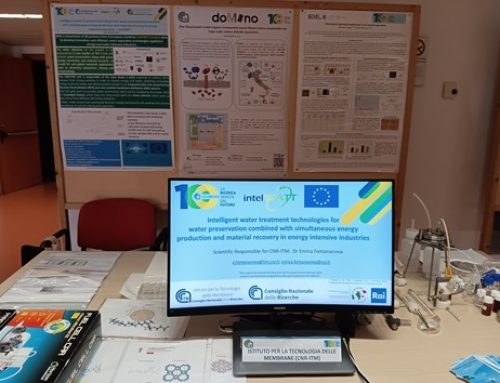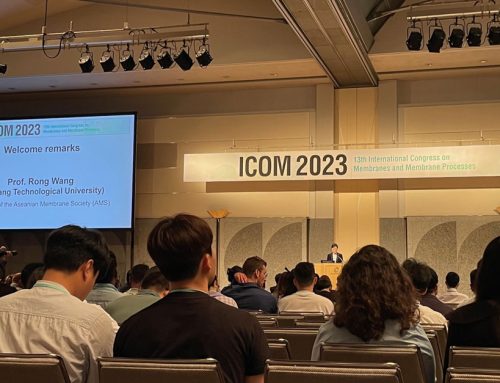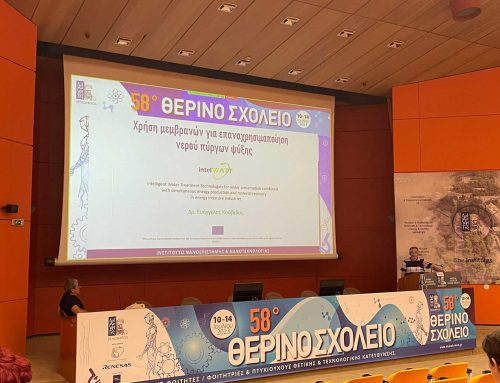intelWATT, “intelligent Water Treatment Technologies for water preservation combined with simultaneous energy production and material recovery in energy intensive industries” is a European project aiming to develop innovative, cost efficient and smart separation technologies for water preservation along with energy production and materials recovery. The concept of circular economy will be demonstrated in three case studies combining advanced membrane processes with smart sensor technology. In addition, intelligent control software modules incorporating real time process adaptation and deep learning capabilities will also be embedded. These novel solutions will be evaluated in three different water and energy intensive industrial sectors: thermoelectric power generation, mining, and electroplating.
The project was launched on October 1st, 2020 and it is coordinated by Dr. Andreas Sapalidis of NCSR “Demokritos”. intelWATT has been funded with more than 10 million Euros from the EU’s Horizon 2020 (CE-SPIRE-07-2020 call) and twenty enterprises and academic partners compose the consortium.
- Membranes area of research and improvement
Graphene based membranes
Recently, graphene and other 2D materials are emerged as promising candidate for membrane fabrications. Graphene oxide (GO) has become a focus in different fields of research due to its impressive properties such as low mass density, excellent mechanical strength, electronic conductivity or high flexibility. In the intelWATT project innovative GO membrane will be produced and optimized as ion exchange membrane with a focus on their scalability for the application in reverse electrodialysis pilot plant.
Biomimetic artificial water channel membranes
The biomimetic water transport can solve/improve the performance and lifetime of bioassisted membrane systems in which highly selective but labile AQPs are used. In terms of economic gain and the economy of matter the artificial systems might represent an interesting alternative. This project, scientifically challenging and of great fundamental interest, is leading to pioneering scientific or applicative discoveries, as literature can attest. Biomimetic water transport, fundamental in nature, should allow not only development of new knowledge and a greater understanding on bottom-up design of multifunctional systems, but also addressing different societal challenges.
- System control area of research and improvement.
One of the main objectives of the project is the development of a smart monitoring system based on machine learning with primary objective to automatically optimize the water usage and a secondary objective to optimize energy consumption for selected rinsing processes. This system will be designed in order to be as much flexible as possible in order to be utilized and adapted to the three use cases of the project.
The Deep Learning Control system platform will control the process based on a reinforcement learning algorithm. The machine learning algorithm will learn the patterns first-hand by being trained on a simulator that will simulate the membrane behaviour. On a second phase the control system platform will be re-trained connecting it to the real industrial environment.
The control system will be composed by sensors that will send the data to the Nokia IoT platform that will feed a data Lake. A dashboard will be developed in order to create a digital twin of the process. The system control based in machine Learning will take the data from the data lake.
NI-Connect platform, provided by Nijhuis industries, will be positioned in the middle between IoT Platform and all local controlling systems. The NI-Connect will ensure maximum lifetime or the membrane maintaining its state within a dynamic range, while avoiding deterioration or break down.
The main improvements in this area is to apply reinforcement learning in controlling membrane condition in order to maximize the system efficiency of the system
- Use cases.
Demonstration in industrial environment for adequate amount of time is crucial for the evaluation of any new and innovative technology. intelWATT identified three challenging industrial sectors for showcasing the proposed solutions:
- Case study 1: Demonstration prototype for Cooling Tower Blowdown (CTBD) treatment. The development of efficient, cost effective, smart solutions for water management in a thermoelectric power plant, aiming at minimization of the cooling tower blow down (>99% recovery) trough developing a pilot unit of 100 m3/day treatment capacity installed in the premise of PPC’s unit V (natural gas combined circle facility, Megalopolis, Greece) based on a closed loop, near zero liquid discharge approach.
- Case study 2: Demonstration of a symbiotic concept between industries: sustainable production of energy and water. In this context, an integrated pilot unit (100 m3/day) comprised by Reverse Electrodialysis (RED) and solar powered membrane distillation (MD) systems.
- Case study 3: The application of a novel, hybrid high recovery RO (HRRO) / Ion exchange (IX) resin prototype will demonstrate the recovery of valuable electrolytes and fresh water preservation in a plastic electroplating facility. The process is aiming towards recovering up to 95 % of Chromium and Copper and 50% of Nickel, while preserving 65% of fresh water.
